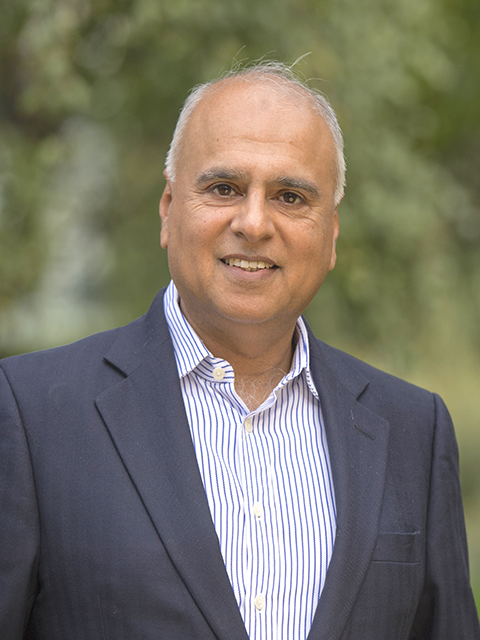Afzal Ashraf has broad experience of International Relations and security issues, both as a practitioner and as an academic. This includes service as a senior officer in the UK Armed Forces in operations ranging from famine relief in Africa to stabilisation operations in the South Atlantic, deterrence support in the Cold War and strategic aspects of conflicts in Iraq and Afghanistan. He has worked in support of diplomacy in the UK’s Foreign and Commonwealth Office and in information fusion, analysis and communication in some of UK’s security related government departments. He has been Head of Training Management for the Royal Air Force where he had responsibility for physical fitness, combat survival and through life learning. He has run a private security consultancy covering areas such as cyber security and countering violent extremism and was a Consultant Fellow at the UK’s oldest Think Tank, the Royal United Services Institute.
Afzal Ashraf has been teaching undergraduates and post graduates a range of international relations and security modules, including designing new ones, at Russell Group Universities in recent years. Before coming to Loughborough University he was Assistant Professor of International Relations at the University of Nottingham where he is now a Visiting Fellow at the Centre for Conflict, Security and Terrorism. He is in demand as a commentator on current affairs, with over 200 television and radio appearances in less than a year on national and international channels and was nominated for University of Nottingham’s 2018 Impact Awards.
Current Research
- Blasphemism. Monograph intended to be the first major work to explain an emerging global threat based on blasphemy as a motivation for political extremism and violence.
- Nuclear Weapons in Islamic ideas of Love, Justice and Peace.
- The ‘Glocal’ of Terrorism. How local political and economic factors impact and are impacted by global terrorism. Based on recently completed research in Kyrgyzstan.
Planned Research
- Regional Impact of China’s BRI. Part of University of Nottingham’s Asia Research Institute ESRC bid for £800k. At final stage submission. Planned start Autumn 2021, subject to formal approval.
- Complex political emergency in the European borderlands and the Western Balkan migration route. Joint bid with research partner Dr Vanessa Pupavac currently being finalised for field research in Winter 2021.
- Negotiable Deterrence – Proposed theory paper based on an emerging role for nuclear weapons in contemporary geopolitical negotiations.
- Ashraf, A and Aslanova, I. (2021). Why We Went to Fight and Why We Returned: Radicalisation and Deradicalisation – Learning from Foreign Terrorist Fighters. Hedayah. https://www.rcrskg.org/post/why-we-went-tofight-and-why-we-returned-3.
- Ashraf, A and Foggett, S. (2021). Media and Counterterrorism in H. Yalçınkaya (ed.) Good Practices in Countering Terrorism. NATO Centre of Excellence Defence Against Terrorism. Vol 1. (pp 127-140). https://www.tmmm.tsk.tr/GOOD_PRACTICES_INCOUNTER_TERRORISM.pdf
- Ashraf, A. (2021). Iraqi Police: A Hard Place Between State and Society. The Brown Journal of World Affairs. 22(2), 1-15. https://bjwa.brown.edu/27-2/iraqi-police-a-hard-place-between-state-and-society/
- Ashraf, A. (2020). Deterrence and Diplomacy. In Deterrence (pp. 35-56). Springer, Cham.
- Ashraf A. (2020). Ideological Underpinnings of the Secularity, Secularism and Religious Challenge in E.S. Elbakyan Secularism, Secularity and Religion: Historical, Legal and Philosophical Aspects. Bishkek (pp 225-232).
- Ashraf, A. (2019). Secular State, Security and Religious Education. In Islam in a Modern Secular State (pp. 98-106). Commission for Religious Affairs, Kyrgyzstan.
- Ashraf, A & Filippidou, A (2017) Terrorism and Technology. NATO COE Defence Against Terrorism
- Ashraf A & Shaw J. (2016) A Military Response to the Syrian Crisis. Evidence to House of Commons Select Defence Committee.
- Ashraf, M. A. (2011). Al Qaeda and the Olympics. In A. Richards, P. Fussey, & A. Silke (Eds.), Terrorism and the Olympics: Lessons for 2012 and beyond. London: Routledge.
- Ashraf, M. A. (2007). Iraqi Insurgency and the Internet. In D. Hansen, & M. Ranstorp (Eds.), Cooperating Against Terrorism. Vallingby, Sweden: Centre for Asymmetric Threat Studies.
- Ashraf, M. A. (2007). Security Sector Reform: Lessons of Policing in Iraq. Policing: Journal of Policy and Practice, 1 (1).
- Ashraf, M. A. (2006). Al-Qaeda's Ideology - Qur'an or Clausewitz. In Global Terrorism Islamabad: Institute of Regional studies.
- Ashraf, M.A. (2004). Jihad, Human Rights and the Treatment of Minorities in Islam. Review of Religions. 99(8).
Submitted for Publication
- Terrorism Propaganda, Chapter in Edward Elgar Handbook of Political Propaganda. Publication December 2021.
- NATO Nations’ Counter Terrorism Experience. Edited Volume proposal submitted to I.B. Taurus in Nov 2020. Awaiting completion of last (introduction) chapter.
Selected Op Eds
- Afzal Ashraf, ‘Obama’s strategy to fight ISIS cedes too much control,’ Guardian, dated 11 September 2014
- Afzal Ashraf, ‘Confrontation key to tackling violent extremism,’ BBC News Website, dated 25 December 2014
- Afzal Ashraf, ‘Coup to End Coups? Commentary on the Turkish Military Coup’ RUSI Website Comment, 21 July 2016
